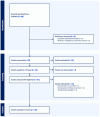Bioethical Considerations of Deploying Artificial Intelligence in Clinical Orthopedic Settings: A Narrative Review
- PMID: 40458232
- PMCID: PMC12126464
- DOI: 10.1177/15563316251340303
Bioethical Considerations of Deploying Artificial Intelligence in Clinical Orthopedic Settings: A Narrative Review
Abstract
Artificial intelligence (AI) has emerged in orthopedics with the potential to improve diagnostic accuracy, optimize surgical workflows, and support personalized care. We conducted a narrative review exploring the bioethical considerations of AI use in the orthopedic clinical setting, focusing on 4 core principles-autonomy, beneficence, nonmaleficence, and justice-to provide orthopedists with a practical framework for AI's implementation. We utilized the Preferred Reporting Items for Systematic Reviews and Meta-Analyses framework to conduct a comprehensive PubMed search; 89 articles were evaluated and 23 met our inclusion criteria. Across these studies, bioethical considerations for the clinical implementation of AI tools consistently emerged, most commonly concerning privacy, bias, transparency, informed consent, and regulation. We offer recommendations for strengthening privacy safeguards, adopting bias mitigation strategies, improving transparency through explainable AI tools, and establishing clear regulatory frameworks with lifecycle evaluation.
Keywords: AI; artificial intelligence; bioethics; ethical considerations; machine learning; orthopedics.
© The Author(s) 2025.
Conflict of interest statement
The author(s) declared the following potential conflicts of interest with respect to the research, authorship, and/or publication of this article: Christian A. Pean, MD, reports relationships with Arthrex Inc, Heraeus Medical LLC, Smith+Nephew Inc., ENCORE MEDICAL, LP, TriCoast Surgical Solutions LLC, Stryker Corporation, and Zimmer Biomet Holdings, Inc.; he is also co-founder and CEO of an AI company, RevelAi Health. The other authors report no potential conflicts of interest.
Figures
References
-
- Banatwala U, Ibrahim MT, Shaikh RH, Shahzad H, Hoodbhoy Z, Noordin S. A comprehensive exploration of artificial intelligence in orthopaedics within lower-middle-income countries: a narrative review. J Pak Med Assoc. 2024;74(Suppl 4):S90–S96. - PubMed
-
- BBC. Google DeepMind NHS app test broke UK privacy law. 2017. Available at: https://www.bbc.com/news/technology-40483202. Accessed January 3, 2025.
-
- Beauchamp TL, Childress JF. Principles of Biomedical Ethics. 5th ed. New York, NY: Oxford University Press; 2001.
Publication types
LinkOut - more resources
Full Text Sources
Miscellaneous



